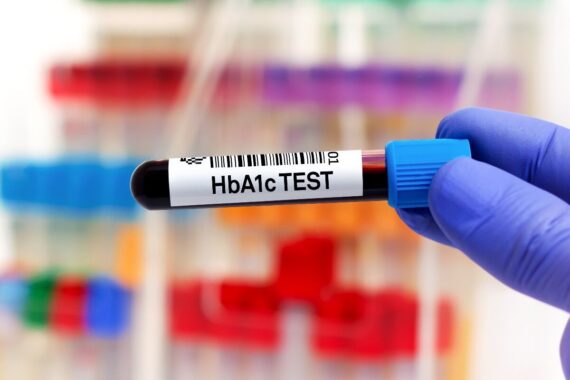Glucose tests may be inaccurate for South Asian people in UK, say researchers who found a genetic link with falsely low HbA1c readings.
It may mean that other tests, such as fasting glucose and oral glucose tolerance tests, or alternative monitoring pathways might be needed in South Asian people who carry the variant but more work is needed before any changes to healthcare guidelines could be made, the UK team said.
The research presented at the Diabetes UK Professional Conference used data from 60,000 people with Bangladeshi or Pakistani ethnicity living in England collected in the Gene & Health study as well as 500,000 people of varied ethnicity living in the UK who took part in UK Biobank.
They found a genetic variant present in in 7.6% of people of South Asian heritage but very rare in other ethnicities affected the accuracy of HbA1c results.
Those with the variant were found to have falsely lower HbA1c levels as well as differences in their full blood count.
It suggests that the genetic variant is linked to changes in red blood cells, which impacts the HbA1c test results. For those with two copies of the genetic variant, HbA1c test results could be falsely lower by around 6 mmol/mol2, the researchers reported.
The study also showed that those with one copy of the variant were diagnosed with type 2 diabetes on average one year later, while those with two copies were diagnosed on average two years later, than those without the genetic variant.
While the study did not assess this, inaccurate HbA1c results might also mean that people with the variant do not receive timely and appropriate treatments, the researchers added.
In England, there are estimated to be more than 420,000 people from a South Asian background living with diabetes and over 230,000 with a diagnosis of prediabetes.
Prevalence of the variant suggests that the HbA1c test is underestimating blood sugar levels in around 32,000 South Asian people with diabetes and 17,500 with prediabetes in England, the researchers calculated.
In addition to more work on what approach may be needed in this group, the researchers also highlighted the need to explore whether inaccurate HbA1c results are contributing to the diabetes inequalities experienced by South Asian people living in the UK.
Study leader Dr Miriam Samuel, an NIHR academic clinical fellow at Queen Mary University London, said: ‘Many genetic variants linked to red blood cell conditions are ultra-rare amongst the Northern Europeans who have historically dominated genetic studies.
‘We demonstrate one such variant that is carried by 7.6% of South Asians which could affect the accuracy of HbA1c and cause delays in diabetes diagnosis.
‘Studies such as Genes & Health, focussing on populations who are underserved in genetic research, are vital to understand the different pathways that may contribute to diabetes inequalities in these communities.’
Dr Elizabeth Robertson, director of research at Diabetes UK, said: ‘This evidence showing that the accuracy of a common test to diagnose and monitor type 2 diabetes is linked to a person’s ethnicity should be urgently investigated further.
‘It’s incredibly important that healthcare professionals are armed with a precise way to evaluate average blood sugar levels over extended periods.
‘Without this, they are navigating in the dark and potentially at risk of overlooking cases of type 2 diabetes.’
















